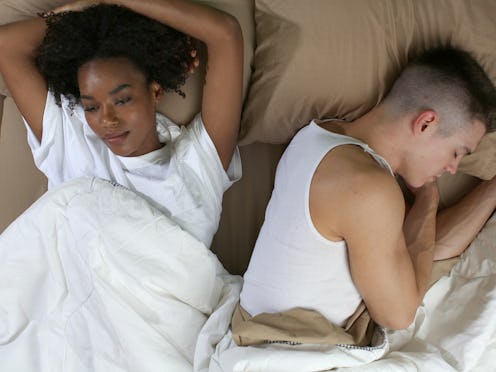Life
A Gender Gap Exists In Sleep Quality, Too

Ensuring you get sufficient, good quality shut-eye each night is important for everyone to maintain their health and well-being throughout their life. But research suggests that women snooze less than men — and it's not necessarily out of choice. Yep, a gender sleep gap exists (along with gaps in wages and access to job opportunities, of course), but the good news is that understanding why we get less sleep than our male counterparts could help us incite some change. Because unlike the omnipresent gender pay gap, the sleep gap is sometimes a little easier to fix.
Sleep has been proven to combat some of the effects of aging; it plays a key role in regulating appetite and mood; and it ensures that our sex drives stay at healthy levels, too. But despite the well-touted benefits of counting Z's, research from the Centers for Disease Control and Prevention (CDC) found that more than a third of American adults are still not getting enough sleep on a regular basis. (They recommend seven to nine hours per night for optimal brain function the next morning).
And now, new research from Georgia Southern University has discovered that if you're a woman with children, your sleep is likely to suffer even further, suggesting that a gender sleep gap does in fact exist.
Researchers collected the self-reported hours of sleep of 5,805 adults. Seven to nine hours per night was considered optimum, while less than six hours was deemed insufficient. Eureka Alert reports that from the responses of 2,908 women aged 45 years and younger, the only factor associated with whether or not they got enough sleep was whether they had children in the house with them, Incredibly, for women, each child increased the odds of insufficient sleep by nearly 50 percent; what's more, only 48 percent of the women 45 and under with kids said they slept seven or more hours a night. In comparison, 62 percent of women under 45 who didn't have children reported getting at least seven hours of sleep each night. Researchers noted that no other factors, such as marital status, education, age or race, were linked to how long these women slept. And — here's the kicker — the study found that for the participants who were men, sleep was not effected at all by whether or not children were in the house.
This study points quite clearly to the existence of a gender sleep gap in family households. And although it doesn't analyze the exact reasons why women with children are more sleep deprived than men in the same position, we do already know that the burden of childcare is often not evenly split; previous research has shown that women are still disproportionately responsible for household responsibility like looking after the kids and taking care of the chores, even when they work full time jobs. It's possible, then, that this inequity might be what's keeping women.
Of course, other factors may also be at play, too. A study published in the Proceedings of the National Academy of Sciences in 2016, for example, analyzed the sleep patters of 15 men and 11 women and found that the circadian rhythm (our internal clock) for women is two whole hours ahead of that of our male counterparts'. And apparently, women also get tired earlier, but still go to bed later in our circadian cycles — and we have more trouble staying asleep once our head hits the pillow. According to the Huffington Post, study author Diane B. Boivin explained, "For a similar sleep schedule, we find that women’s body clocks cause them to fall asleep and wake up earlier than men. The reason is simple: Their body clock is shifted to a more easterly time zone. This observed difference between the sexes is essential for understanding why women are more prone to disturbed sleep than men."
The reason for this different circadian rhythm may be down to biology and hormones. Although it varies considerably among each woman, expert Dianne Augelli, M.D. told CNN that fluctuating estrogen levels throughout the menstrual cycle can affect our ability to fall and stay asleep: "Estrogen works on several different neurotransmitter pathways that may have an impact on the regulation of sleep, and progesterone can have a hypnotic property," said Dr. Augelli. "Fluctuations in these hormones may have an effect on the circadian rhythm."
There's also the fact that insomnia is more common in women than men and that women are more vulnerable than men to stress and anxiety problems — all of which can have a negative effect on our ability to get good quality sleep. Food for though.
Everyone, though — and I mean everyone — deserves to sail of to the land of Nod each night, uninterrupted and for at least seven hours. If you're having trouble, there are a few things you might try — going to bed earlier each night, changing your diet and introducing a good sleep routine, for example, or going and visiting a sleep specialist. Good luck!